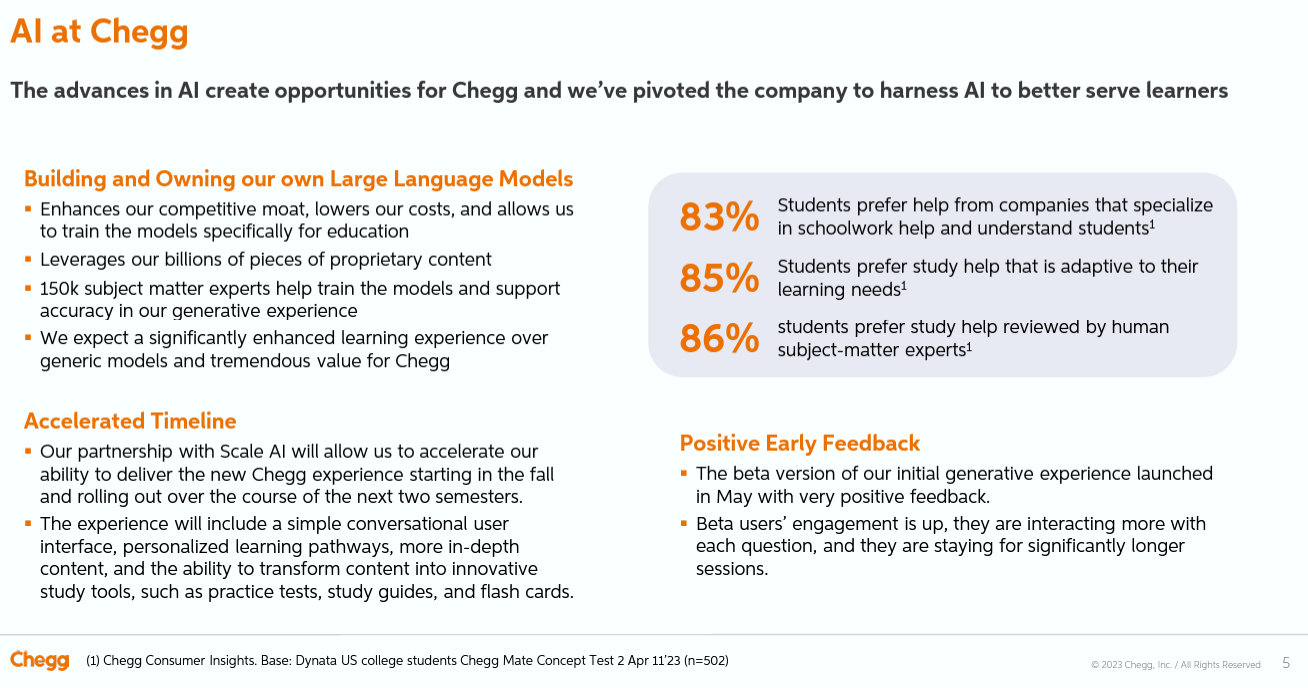Why Chegg is using Scale AI to develop proprietary LLMs
Chegg is betting that a partnership with Scale AI can provide a new student experience over the next two semesters and develop proprietary large language models (LLMs) that can create personalized study tools. The goal: Develop generative AI tools that leverage Chegg's differentiated data and get to market fast.
The partnership was announced as Chegg reported second quarter earnings. The two companies have been piloting the new AI experience for students.
Generative AI has been a key topic for education technology providers. In the first quarter, Chegg shares took a beating over generative AI concerns but did launch its CheggMate generative AI service and a partnership with OpenAI. Generative AI is being built into the education technology stack with some efforts available in the fall.
Chegg's new experience will start rolling out this fall. Chegg CEO Dan Rosensweig said that the Scale AI partnership is accelerating the company's generative AI deployment. He said:
"The new Chegg will combine the best of generative AI, with Chegg's proprietary high-quality solutions and demonstrated ability to improve student outcomes. They can expect to see a much simpler conversational user interface, personalized learning pathways, more in-depth content and the ability to transform it automatically into innovative study tools such as practice tests, study guides and flash cards."
In addition, Chegg is building its own LLMs with training data provided by its proprietary data sets and more than 150,000 subject matter experts, said Rosensweig. Chegg has a learning taxonomy and a history of data from schools, classes and professors.

Andrew Brown, Chegg CFO, said the company’s decision to develop its own LLMs revolves around differentiating its service and creating "a truly differentiated and better experience with students at a lower cost." Brown added that completely relying on third parties for generative AI technology would have been too expensive.
For Rosensweig, the role of proprietary LLMs is to improve accuracy and engagement. Rosensweig, who noted that Chegg will still use ChatGPT, said:
"One of the really cool things that we'll be able to do differently than anybody else would be able to do is take the 100 million-plus questions that we have and all the data we've been able to collect and create completely personalized learning experiences on a per user basis based on knowing not only the history of that particular student, but others that have gone to that school, that class and with that professor. So that is not something that any generalist AI can do or frankly, anybody else in the education space could do because we have the largest direct-to-consumer list."
The plan for Chegg and Scale AI is to deploy a rolling launch to cover all 26 categories.
Chegg reported second quarter earnings of $24.6 million on revenue of $182.9 million, down 65 from a year ago. Non-GAAP earnings were 28 cents a share, a penny a share lower than estimates.
The company ended the quarter with 4.8 million subscribers, down 9% from a year ago. For the seasonally slow third quarter, Chegg projected revenue in the range of $151 million to $153 million.

